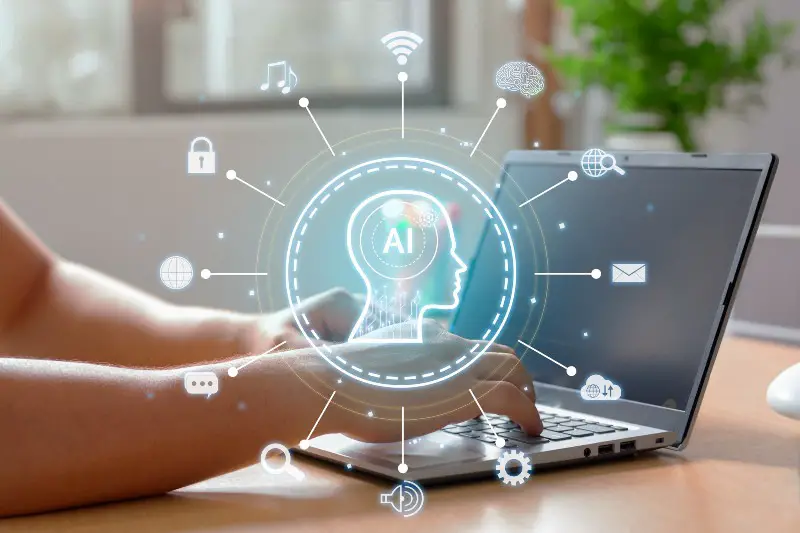Introduction
In the realm of Artificial Intelligence (AI), AI Horizon stands as a pivotal force driving significant transformations in healthcare, education, and digital security. This blog post explores the profound impact of AI in these areas, focusing on its integration in healthcare, its role in enhancing the learning experience for students and educators, the advancements in natural language processing (NLP), and the critical aspect of privacy and security. Each of these domains is experiencing a paradigm shift, driven by the innovative applications of AI. We will navigate through the myths and realities, offer practical advice, and delve into the implications of AI in these fields.
AI Horizon is more than just a technological trend; it’s a new reality that’s redefining how we approach health, education, and digital security. Whether you’re a healthcare provider, an educator, a student, or someone interested in the evolving world of digital security, this post will provide comprehensive insights into how AI is revolutionizing these areas. Join us as we explore the opportunities and challenges presented by the AI Horizon.
Healthcare and AI
Transforming Healthcare with AI
In healthcare, AI is revolutionizing patient care, diagnostics, and treatment methodologies. AI algorithms can process vast amounts of medical data, leading to more accurate diagnoses and personalized treatment plans. This advancement is not only enhancing the quality of healthcare but also making it more accessible and efficient.
AI’s Role in Medical Research
Beyond patient care, AI significantly impacts medical research. It aids in analyzing complex datasets, accelerates drug discovery, and contributes to understanding intricate health conditions. AI’s ability to process and interpret large volumes of data is invaluable in medical breakthroughs, potentially leading to cures for previously untreatable diseases.
Students and Educators and AI
AI in Enhancing Learning Experiences
For students and educators, AI is a transformative tool in the educational landscape. It personalizes learning experiences, adapts to individual learning styles, and provides interactive and engaging educational content. AI is reshaping how knowledge is delivered and absorbed in the classroom.
AI’s Role in Educational Research and Development
AI is playing a crucial role in educational research and development. It’s being used to analyze educational trends, improve teaching methodologies, and develop new learning tools. AI is paving the way for a more informed and innovative approach to education.
Natural Language Processing and AI
Revolutionizing Communication
Natural Language Processing (NLP), a significant branch of AI, is revolutionizing the way machines understand and interact with human language. NLP enables machines to read, decipher, and respond to human language in a meaningful way, enhancing communication between humans and computers.
NLP in Various Applications
The applications of NLP are vast, ranging from voice-activated assistants to automated customer service chatbots. In education, NLP is being used to develop tools that can understand and respond to students’ queries, making digital learning more interactive and personalized.
Privacy and Security in the Age of AI
Balancing AI Advancements with Privacy Concerns
The integration of AI into various sectors raises significant privacy and security concerns. As AI systems become more adept at processing and analyzing data, the risk of personal data misuse and privacy breaches increases. It’s crucial to balance the benefits of AI with robust privacy and security measures.
AI’s Role in Enhancing Cybersecurity
Conversely, AI can play a crucial role in enhancing cybersecurity. AI systems, through pattern recognition and anomaly detection, can identify potential threats and breaches more efficiently than traditional methods. This proactive approach is vital in an era where cyber threats are increasingly sophisticated.
Myths vs. Facts about AI in Education
Myth: AI Will Make Educators Obsolete
Fact: AI is intended to augment educators, not replace them. It provides tools and resources that enhance teaching methods and student engagement.
Myth: AI in Education is Limited to Advanced Technology Courses
Fact: AI’s application in education extends beyond technology courses. It’s being used across various subjects to personalize learning and provide insights into student performance.
Myth: AI Compromises the Quality of Education
Fact: When used effectively, AI can actually enhance the quality of education by providing personalized learning experiences and innovative teaching tools.
FAQ Section
Q1: How is AI Transforming Healthcare?
A1: AI is transforming healthcare by enhancing diagnostic accuracy, personalizing treatments, and improving patient outcomes. It’s making healthcare more efficient and proactive.
Q2: What Role Does AI Play in Education?
A2: AI plays a crucial role in education by personalizing learning experiences, providing interactive content, and aiding in educational research and development.
Q3: How is NLP Used in AI?
A3: NLP in AI involves enabling machines to understand and interact with human language, enhancing communication and making digital interactions more natural.
Q4: What are the Privacy Concerns with AI?
A4: Privacy concerns with AI include data misuse, surveillance, and the potential for AI to make decisions based on sensitive information. Ensuring data privacy and ethical AI practices is essential.
Q5: Can AI Improve Healthcare Security?
A5: Yes, AI can significantly improve healthcare security by detecting and responding to cyber threats more efficiently. It enhances traditional security measures with its advanced analytical capabilities.
Practical Tips and Tricks for AI Integration
- Prioritize Data Quality: Ensure high-quality, diverse data for training AI systems to improve accuracy and reduce bias.
- Focus on Ethical AI: Implement AI solutions that prioritize ethical considerations and data privacy.
- Embrace Continuous Learning: Stay updated with the latest AI developments and continuously adapt strategies.
- Foster Collaboration: Collaborate across departments and with AI experts to effectively integrate AI into business processes.
- Monitor and Evaluate: Regularly assess the performance and impact of AI systems to ensure they meet business objectives.
Google Snippets
AI in Healthcare
“AI in healthcare refers to the use of machine learning algorithms and software to analyze medical data, leading to improved diagnostics, treatment planning, and patient care.”
Natural Language Processing in AI
“Natural Language Processing in AI enables machines to understand, interpret, and respond to human language, enhancing communication and user experiences.”
Privacy and Security in AI
“Privacy and security in AI are crucial, involving protecting sensitive data and ensuring AI systems are used responsibly and ethically, especially in data-intensive applications.”
Artificial Intelligence Meaning
- Oxford Languages: “Artificial intelligence is the theory and development of computer systems able to perform tasks that normally require human intelligence, such as visual perception, speech recognition, decision-making, and translation between languages.”
- Merriam-Webster: “A branch of computer science dealing with the simulation of intelligent behavior in computers.”
- Cambridge Dictionary: “The study of how to produce machines that have some of the qualities that the human mind has, such as the ability to understand language, recognize pictures, solve problems, and learn.”
Did You Know?
- The first AI program to run in the United States was a checkers-playing program created in 1952.
- NLP technology is being used to create tools that can translate languages in real-time, breaking down communication barriers.
- Ethical AI is a growing field, focusing on ensuring AI development and implementation align with moral values and societal norms.
Conclusion
The exploration of AI Horizon reveals a transformative journey for healthcare, education, and digital security. AI’s potential in these areas is vast, offering both opportunities and challenges. As AI continues to evolve, it’s crucial to balance its technological prowess with ethical considerations and privacy concerns. The future of AI is not just about technological advancements; it’s about shaping a world where AI enhances human capabilities and operates within a framework of ethical and secure practices. The AI Horizon is an exciting realm of possibilities, and navigating it successfully requires a thoughtful and informed approach.







